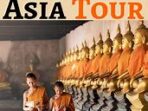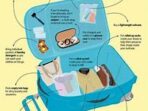
First-Time Travel Tips for Exploring Top Asian Destinations
Asia, a continent of breathtaking diversity, is a dream destination for many first-time travelers. From the bustling metropolises to the serene landscapes, there’s something for everyone to discover. But with so much to see and do, it can feel overwhelming to strategy your first Asian adventure.
This thorough guide will equip you with the essential first-time travel tips to make your journey smooth, enjoyable, and unforgettable. Whether you’re fascinated by the ancient temples of Thailand, the vibrant industrys of Vietnam, or the snow-capped peaks of Nepal, this article will help you navigate the unique obstacles and rewards of exploring Asia.
Packing Essentials for Your First Asian Adventure
Packing for Asia can be a balancing act, ensuring you have everything you need while avoiding unnecessary weight. Here are some key items to pack for a comfortable and enjoyable trip:
Clothing:
- Lightweight and breathable fabrics: Opt for fabrics like cotton, linen, or quick-drying synthetics for comfort in humid climates.
- Versatile outfits: Choose clothes that can be layered and mixed and matched to develop varied looks.
- Comfortable shoes: Pack a pair of sturdy walking shoes for sightseeing and exploring. Flip-flops or sandals are also essential for casual wear.
- Swimsuit: For beach trips or poolside relaxation.
- Modest clothing: Respect local customs and traditions by packing modest clothing, especially when visiting religious sites.
- Rain gear: Be prepared for sudden downpours with a lightweight raincoat or umbrella.
Other Essentials:
- Universal adapter: Asian countries utilize various electrical outlets, so a universal adapter is a must.
- First-aid kit: Pack a basic first-aid kit with essential medications.
- Travel-sized toiletries: Pack travel-sized toiletries, including sunscreen, insect repellent, and hand sanitizer.
- Travel pillow and eye mask: For comfortable long flights and overnight journeys.
- Reusable water bottle: Stay hydrated by carrying a reusable water bottle and refilling it regularly.
- Small backpack or daypack: For carrying essentials on day trips and exploring.
Navigating Airports and Transportation in Asia
Navigating airports and transportation systems in Asia can be a new experience for first-time travelers. Here’s what you need to know:
Airports:
- Visa on arrival: Check if your destination offers visa on arrival, and if so, ensure you have the necessary documents.
- Currency exchange: Exchange your currency at authorized booths within the airport to avoid scams.
- Transportation to city: Pre-book a taxi or airport transfer service for a safe and convenient ride to your accommodation.
Transportation:
- Public transportation: Public transport in Asia is generally efficient and affordable. Use local butilizes, trains, or subways to get around.
- Taxis: Taxis are readily available in most cities. Negotiate fares before entering the taxi, or utilize ride-sharing apps like Grab or Gojek.
- Motorcycle taxis: In some cities, you can utilize motorcycle taxis for quicker travel, especially in congested areas.
- Local butilizes: Local butilizes are a cheap and efficient way to travel between cities and towns.
Cultural Etiquette: Dos and Don’ts in Asian Countries
Understanding and respecting local customs is crucial for a smooth and enjoyable travel experience. Here are some dos and don’ts to remember:
Dos:
- Greet with a smile and a nod: A smile and a nod are universal signs of politeness.
- Use proper greetings: Learn basic greetings in the local language.
- Remove your shoes before entering temples or homes: This is a common practice in many Asian countries.
- Eat with your right hand: In many cultures, eating with your left hand is considered unclean.
- Be mindful of noise levels: Keep your voice down in public areas and avoid loud conversations.
Don’ts:
- Touch people on the head: This is considered disrespectful in many cultures.
- Point with your finger: Use your whole hand instead.
- Show public displays of affection: This is generally frowned upon in many Asian countries.
- Talk loudly in public: Keep your voice down and avoid using offensive language.
- Take photos without permission: Ask for permission before taking photos of people or religious sites.
Budgeting and Money Matters for Your Trip
Planning your budget is essential for a stress-complimentary trip. Here’s a breakdown of expenses to consider:
Accommodation:
- Budget-friendly options: Hostels, guesthoutilizes, or budget hotels are good options for cost-conscious travelers.
- Mid-scope options: For added comfort and amenities, consider mid-scope hotels or boutique accommodations.
- Luxury options: For an indulgent experience, splurge on luxury hotels or resorts.
Food:
- Street food: Street food in Asia is not only affordable but also incredibly delicious.
- Local restaurants: Try local restaurants for authentic cuisine at reasonable prices.
- International restaurants: For a change of taste, you can find international restaurants in major cities.
Transportation:
- Public transport: Public transport in Asia is generally very affordable.
- Taxis: Taxis can be more expensive, so negotiate fares before getting in.
- Domestic flights: For long distances, consider budget airlines for affordable domestic flights.
Activities and Attractions:
- Entrance fees: Expect to pay entrance fees for attractions, temples, and other sights.
- Guided tours: Guided tours can be a great way to learn about the history and culture of the region.
- Shopping: Asia is a shopper’s paradise. Be mindful of your budget and avoid overspending.
Money:
- Currency exchange: Exchange your currency at reliable exchange bureaus or banks.
- ATMs: ATMs are readily available in most cities.
- Credit cards: Credit cards are accepted in major cities, but not everywhere.
Essential Apps and Resources for Asian Travelers
Technology can be a great asset for first-time travelers. Here are some essential apps and resources:
Navigation Apps:
- Google Maps: Essential for navigating cities and finding attractions.
- Citymapper: Provides detailed public transport information in major cities.
Translation Apps:
- Google Translate: Translate text, speech, and images in real-time.
- Microsoft Translator: Offers accurate translations and backs multiple languages.
Booking Apps:
- Booking.com: For finding and booking accommodation.
- Agoda: Another popular platform for finding accommodation deals.
- Airbnb: For finding unique accommodations, including apartments and homes.
Other Useful Apps:
- Grab: Ride-sharing app available in many Southeast Asian countries.
- Gojek: Ride-sharing and delivery app available in Indonesia.
- TripAdvisor: Read reviews and get recommendations on attractions, restaurants, and hotels.
Understanding Visa Requirements and Immigration Procedures
Visa requirements vary depending on your nationality and destination. It’s crucial to comprehend the visa requirements and immigration procedures for your trip.
- Visa on arrival: Some countries offer visa on arrival, but you must check the eligibility criteria and required documentation.
- E-visa: Many countries now offer an e-visa, which can be applied for online.
- Regular visa: If you need a regular visa, implement for it well in advance of your trip.
- Immigration procedures: Familiarize yourself with the immigration procedures at your destination.
Staying Safe and Healthy While Traveling in Asia
Safety and health are paramount while traveling. Here are some tips to stay safe and healthy:
Safety:
- Be aware of your surroundings: Stay vigilant and avoid walking alone in deserted areas.
- Keep your valuables safe: Use a money belt or secure pouch for crucial documents and cash.
- Don’t flaunt your valuables: Avoid wearing expensive jewelry or carrying large sums of cash.
- Stay in well-lit and safe areas at night: Avoid walking in dark or isolated areas at night.
Health:
- Travel insurance: Get thorough travel insurance that covers medical emergencies, flight delays, and lost luggage.
- Vaccinations: Check with your doctor about recommended vaccinations for your destination.
- Drink bottled water: Always drink bottled water and avoid drinking tap water.
- Eat at reputable restaurants: Choose restaurants with good hygiene practices to avoid food poisoning.
- Use insect repellent: Apply insect repellent to prevent mosquito bites and protect against diseases like dengue fever.
Exploring the Best Local Food and Cuisine
Exploring the local cuisine is a highlight of any Asian adventure. Here are some tips for experiencing the optimal culinary delights:
- Street food: Don’t be afraid to try the street food, which is often delicious and affordable.
- Local restaurants: Seek out local restaurants for authentic dishes and unique flavors.
- Cookery classes: Take a cooking class to learn the art of preparing traditional Asian dishes.
- Food industrys: Visit local industrys for fresh generate, spices, and a glimpse into local culture.
- Food tours: Join a food tour to discover hidden culinary gems and taste regional specialties.
Respecting Local Customs and Traditions
Respecting local customs and traditions is crucial for a positive travel experience.
- Dress modestly: Dress modestly, especially when visiting religious sites.
- Be mindful of noise levels: Keep your voice down and avoid loud conversations in public areas.
- Use appropriate greetings: Learn basic greetings in the local language.
- Avoid public displays of affection: This is generally frowned upon in many Asian countries.
- Take photos with respect: Ask for permission before taking photos of people or religious sites.
Finding Accommodation and Booking Your Stay
Finding the right accommodation is essential for a comfortable and enjoyable trip.
- Consider your budget: Decide on a budget for accommodation and select options that suit your needs and preferences.
- Research locations: Choose locations that are convenient for sightseeing and transportation.
- Read reviews: Read reviews on reputable travel websites like Booking.com, Agoda, and TripAdvisor.
- Book in advance: Book your accommodation well in advance, especially during peak seasons.
- Check for amenities: Ensure your accommodation offers the amenities you need, such as Wi-Fi, air conditioning, and a comfortable bed.
FAQs
Q: What are some popular Asian destinations for first-time travelers?
A: Some popular destinations for first-time travelers in Asia include:
- Thailand: Known for its beautiful beaches, ancient temples, and vibrant culture.
- Vietnam: Offers stunning landscapes, delicious cuisine, and a fascinating history.
- Japan: A country of technological marvels, ancient traditions, and beautiful natural landscapes.
- South Korea: A dynamic destination with bustling cities, historical sites, and a unique pop culture.
- Singapore: A cosmopolitan city-state with world-class attractions, delicious cuisine, and a multicultural vibe.
Q: How do I stay safe while traveling in Asia?
A: To stay safe while traveling in Asia:
- Be aware of your surroundings and avoid walking alone in deserted areas.
- Keep your valuables safe and avoid flaunting them.
- Stay in well-lit and safe areas at night.
- Use reputable transportation services.
- Follow local customs and dress modestly.
Q: What are some essential travel documents for Asia?
A: Essential travel documents for Asia include:
- Passport: Ensure your passport is valid for at least six months beyond your intended stay.
- Visa: Check visa requirements for your destination and implement for a visa well in advance.
- Return or onward ticket: You may need to present a return or onward ticket at immigration.
- Proof of accommodation: Some countries may require proof of accommodation.
- Travel insurance: Essential for covering medical emergencies, flight delays, and lost luggage.
Q: How do I communicate with people in Asia?
A: To communicate with people in Asia:
- Learn basic greetings in the local language.
- Use translation apps to overcome language barriers.
- Be patient and respectful when communicating.
- Use non-verbal communication, such as smiles and nods.
- Consider hiring a local guide for assistance.
Q: What are some tips for first-time travelers to Asia?
A: Here are some tips for first-time travelers to Asia:
- Research your destination thoroughly.
- Pack light and select versatile clothing.
- Understand local customs and traditions.
- Be mindful of your budget.
- Use technology to your benefit.
- Stay safe and healthy.
- Embrace the local cuisine and culture.
- Be patient and adaptable.
- Enjoy the adventure!
In conclusion, exploring Asia for the first time can be an incredible experience. By follosucceedg these tips, you can ensure a smooth, enjoyable, and unforgettable journey. From packing essentials to navigating airports and respecting local customs, each step will help you make the most of your adventure. Embrace the diversity, immerse yourself in the culture, and develop memories that will last a lifetime.





